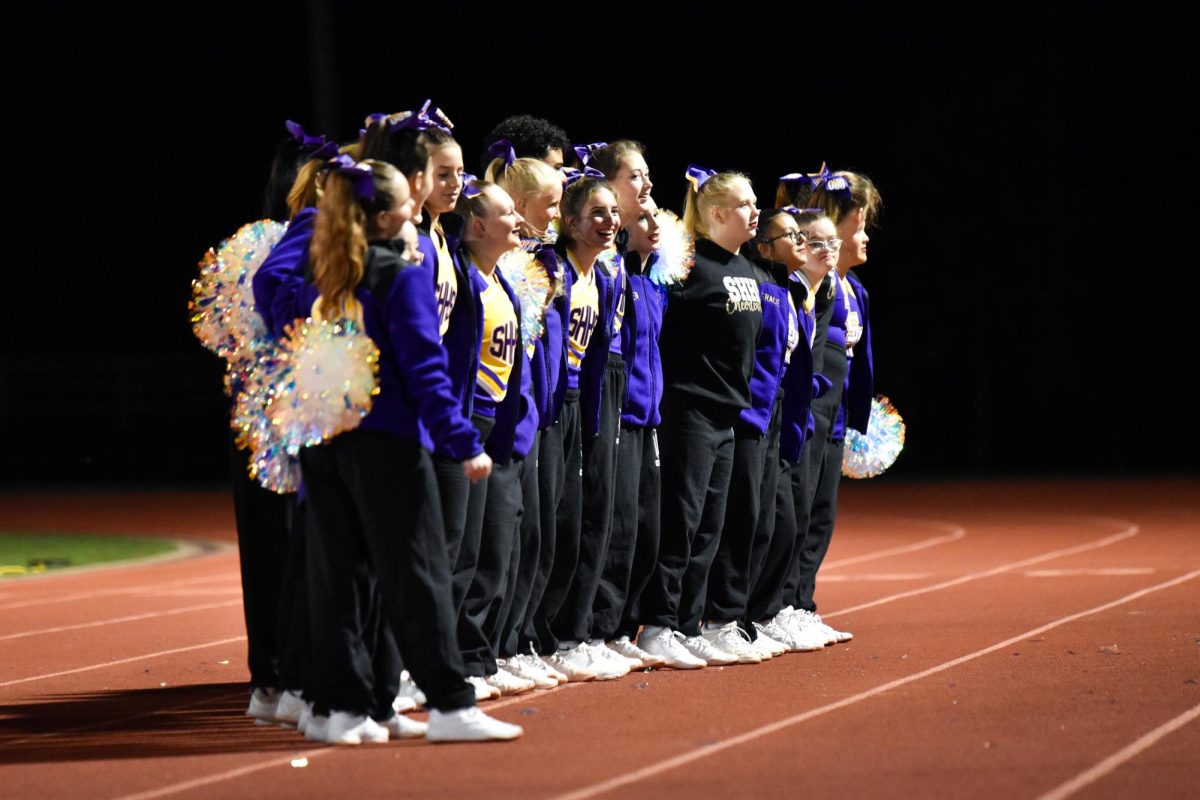“In a lot of ways [school spirit is] the lifeblood and the heartbeat of the school,” said Fred Bouchard, head football coach. “School happens all over America every day, but school pride and school spirit doesn’t resonate in every school.”
Bouchard was a football coach at a high school in Missouri before transitioning into the role of assistant superintendent for the same district. During their time as a superintendent, they realized just how important it is for school spirit to be present in the classroom and at school events.
The high school has had an alma mater since the 1990s, but in recent years it has been lost to graduating classes of the past. Last year, Tristan Bartley, band director, with the help of the band, restarted the tradition of playing the alma mater after varsity football games.
“The alma mater is supposed to be an ode to the great things about your school and community. It’s a call for alumni to reflect and for current students to feel a sense of responsibility and ownership toward the building, people, and activities that happen in their school,” Bartley said. “The moment of playing the alma mater can bring the school together in big moments to remind ourselves of the responsibility we have to Spring Hill.”
But the school was not brought together immediately. Not many people knew what was going on for the first few games, and even fewer joined in. Eventually the cheer team joined, and after that a handful of students would stay. This did not discourage Bartley, though.
“Someone had to get it started, and I think the band had a great opportunity to do that.”
Bartley explained that community is not just found, but built.
“Having opportunities to relate to one another and join together needs to be valued,” Bartley said. “Homefield advantage is not just a saying, it is a consequence of the research-backed psychology of confidence and community.”
Although football and band are completely different in their physical demands, both activities join together under the lights much like their coaches and directors’ philosophies do.
As the new head football coach, Bouchard has made plenty of changes. Perhaps one of the more notable ones is their decision to have the football team join the new alma mater tradition.
“Those are folks that are supporting us, so why wouldn’t you turn around and spend a little bit of time saying, ‘We see you guys. We recognize we’re in here together, that this is a night for our community, and we’re a part of it,’” said Bouchard.
The players support it, too.
“This year I feel like we’re more of a school instead of a football team and a student section,” said Syler Stewart, varsity football player, 12. “After the games we’re all excited and everybody’s happy, everybody’s talking, everybody’s cheering. Once we start playing the song, everyone locks arms and starts swaying. I think [it is] a good tradition to start, and I feel like once we get the words, it’s going to be a cool thing to have after the games.”
There is also a third component to school spirit specifically at football games — hype squad. Hype squad members are not just dispersed in the stands; they also lead the student section as a whole.
In recent years, though, members have been having trouble getting the student section in on the fun as a whole.
“It’s hard to get the crowd hype. Everyone has to get involved. I’ve asked some of the freshmen if they could hear [from the top of the stands] and they said, ‘No, the juniors and the sophomores aren’t paying attention,’” said Aubrey Meder, hype squad member, 12. “I think everyone just thinks of it as a social thing instead of [going to support] your team and having fun being a Bronco.”
Isla Melius, hype squad member, 11, and Meder both agree that at Spring Hill, school spirit is lacking in some aspects. Recently the duo went to homecoming at St. Thomas Aquinas, and during the dance, the school broke out into song when the alma mater came on.
“Everyone was swaying, and everyone knew it. Everyone was screaming the words and punching their fists. Even though we didn’t know the words, just being there felt really cool – that everyone knew it and everyone embraced it and sang it loud,” said Meder.
Meder and Melius wish that was the case at Spring Hill, too.
“I bet, at Aquinas, if you don’t know the alma mater, you get judged, but for us, if you knew the alma mater, you would get judged. It’s like the opposite,” said Melius.
Meder explained that at Aquinas, freshmen come in knowing how much school spirit the student body has, so everyone adopts that attitude quickly. They said that it is hard to jumpstart a philosophy like that in one year, but that additions like the alma mater have helped.
“It takes people creating aspects of the school that everyone can be proud of and then supporting those things,” said Bartley. “School spirit is built and created from the bottom up. Come one, come all, it would be great if the entire school could sing the alma mater.”



